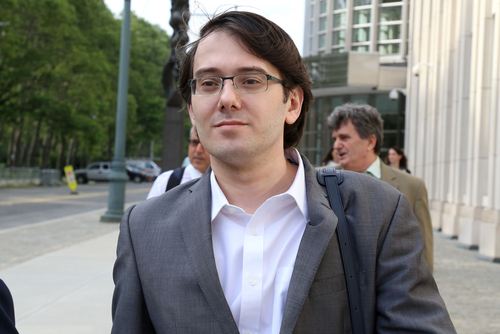One-of-a-kind Wu-Tang Clan album and lawyer payments at risk as a result of Shkreli forfeiture order

Martin Shkreli/Shutterstock.com.
A federal judge in Brooklyn, New York, has ordered former drug company CEO Martin Shkreli to forfeit $7.36 million in connection with his conviction for securities fraud.
U.S. District Judge Kiyo Matsumoto said Shkreli will have to pay the money from his own funds or from “substitute assets”—which could include a one-of-a-kind album by hip-hop group Wu-Tang Clan, report Bloomberg News, Courthouse News Service, CNBC and Ars Technica. Shkreli reportedly paid $2 million for the album, though questions have been raised about its authenticity, according to CNBC.
Shkreli was convicted for using proceeds from his publicly traded drug company, Retrophin, to pay back investors who lost money in two of his hedge funds. Substitute assets include the Wu-Tang Clan album called “Once Upon a Time in Shaolin”; a Lil Wayne album called “Tha Carter V”; a Picasso painting, $5 million in an E-Trade account; and Vyera Pharmaceuticals, formerly Turing Pharmaceuticals.
Turing Pharmaceuticals wasn’t part of the criminal case, but Shkreli’s leadership of the company was in the news when he hiked the price of its lifesaving drug Daraprim by more than 5,400 percent to $750 per pill.
Matsumoto rejected an argument that the forfeiture would make it impossible for Shkreli to pay his lawyers, his accountants and the Internal Revenue Service.
“Mr. Shkreli has provided no authority, however, for the proposition that otherwise forfeitable proceeds should not be subject to forfeiture because the defendant owes money to other potential creditors,” she wrote.
Matsumoto stayed her order pending resolution of any appeal.
Sentencing for Shkreli is set for Friday. The government is asking for a sentence of at least 15 years in prison, CNBC reports. Shkreli’s lawyers have called for a sentence of 12 to 18 months in prison.
“At its core, this case is about Shkreli’s deception of people who trusted him,” the government’s sentencing memo says.
“Indeed, he compounded the lies with a pattern of corrupt behavior designed to cover up those lies. He lied to get investors’ money, he lied to keep them invested in his funds and he lied once those investors wanted their money back. He stole money from investors to pay off personal debts to, among others, Merrill Lynch. He lied to Retrophin’s Board, and stole millions of dollars and shares from the company. He lied to a market that believed the price of Retrophin’s shares was set by natural market forces.”



